So you have started down the wonderful path of chicken ownership. You raised a few hens and are ready to increase your flock. You can raise chicks from your own flock and have your hen do all the work. There is no need to invest in an incubator or brooder box. And there is nothing more satisfying to your chicken world than watching a hen hatch a clutch of eggs.
Today, I am going to give you several tips to help your hen do what she instinctively knows: Hatch her eggs. It amazes me that a hen I have either purchased from a hatchery or hatched in the incubator, knows how to set on a nest, hatch the eggs, and take care of the chicks — even though she didn’t start out that way.
Your hen may or may not need help hatching her eggs, but here are some things to consider.
1. Find Fertile Eggs
Before you can get your broody hen to hatch eggs, you will need to identify some fertile eggs. There are two ways to obtain fertile eggs.
Get Fertile Eggs From Your Flock’s Rooster
If you have a rooster, your eggs will be fertile. This may be obvious to most people, but if you are brand new to raising chickens, you may not have thought of it. Mainly because hens will lay eggs whether or not there is a rooster in your flock. If you do not have a rooster, the eggs are unfertilized. Once you have a rooster who services your hens, the eggs will be fertile.
Purchase Fertile Eggs
If you are not allowed to have a rooster where you live, you can still hatch chicks. You simply find someone who has a rooster with their hens and purchase eggs from them. You must wait until you have a broody hen. Replace your unfertilized eggs with the fertile ones, and you’re all set.
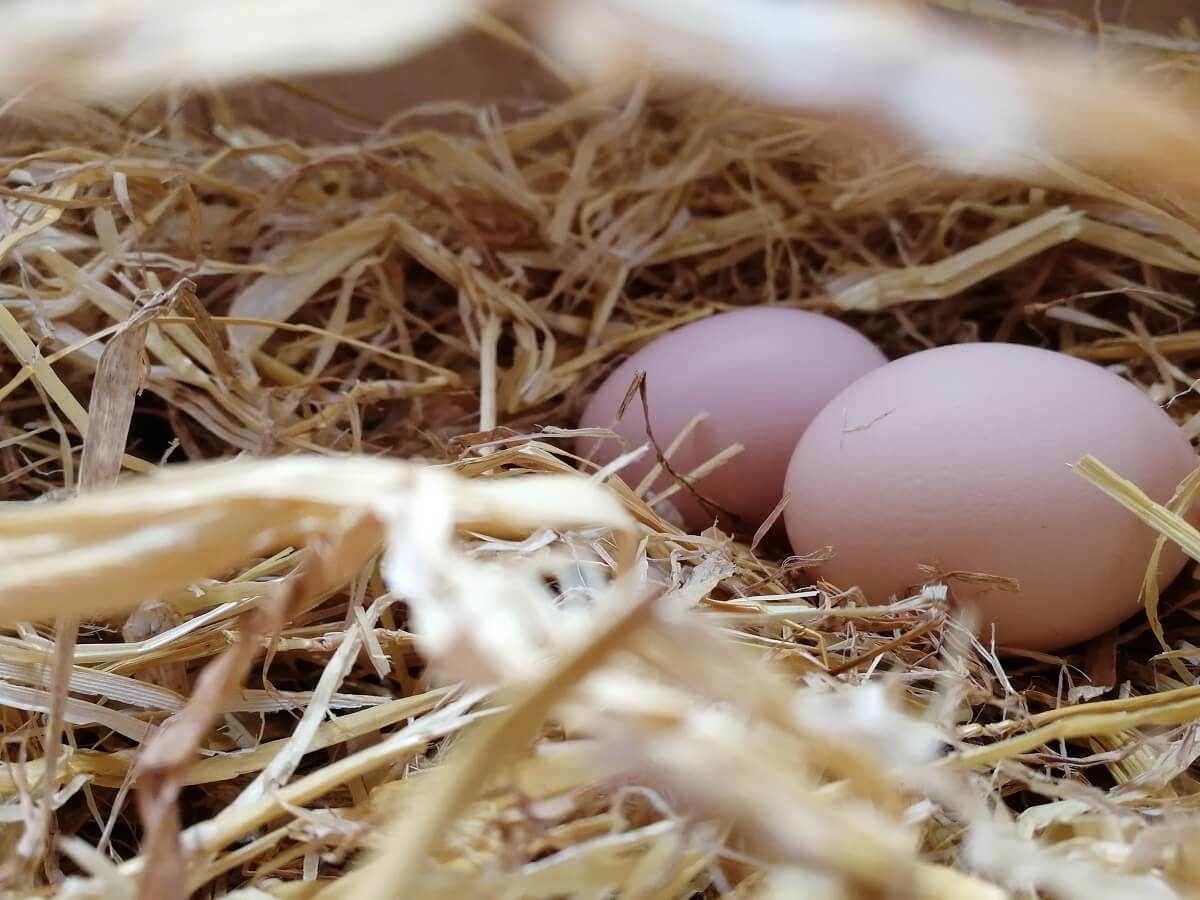
If you are not sure where to find fertile eggs you can look on Craigslist or Facebook Marketplace for someone who sells eggs. You can also go to your local farmers market, find someone who sells eggs, and ask them if they have a rooster.
Related Post: Chicken Hatcheries
If they wash their eggs, ask them to save you unwashed, fresh eggs to purchase. Washed eggs do not have as high a hatch rate as unwashed eggs.
2. Identify A Broody Hen In Your Flock
One important thing to remember is that you can’t really force a hen to set on eggs. A hen will become broody — which means she is inclined or wanting to hatch eggs.
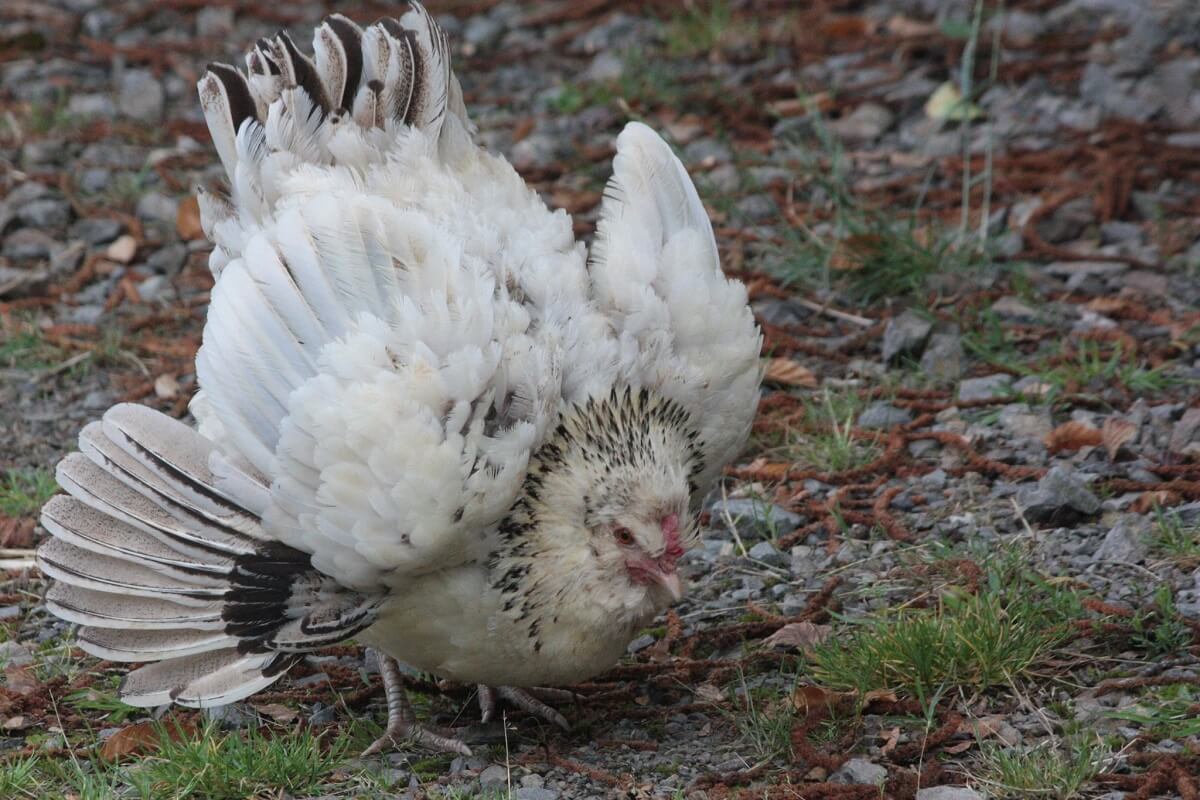
Signs Of A Broody Hen
- She sits in the nesting box all day.
- When you try to collect the eggs under her, she “growls”, fluffs out her feathers, and pecks at you.
- She lays her eggs in a hidden nest rather than the nesting box.
- When you remove her from the nest, she is very vocal and acts strangely. She stays low to the ground, fluffs out, and clucks continually. She usually returns to the nesting boxes quickly.
3. Separate The Broody Hen From The Flock
After you have identified the broody hen, it is important that you separate her from the flock and don’t allow any other hens around her.
The main reason for this is if she is in a nesting box, other hens will continue to lay eggs there. You will end up with too many eggs at all different stages of incubation.
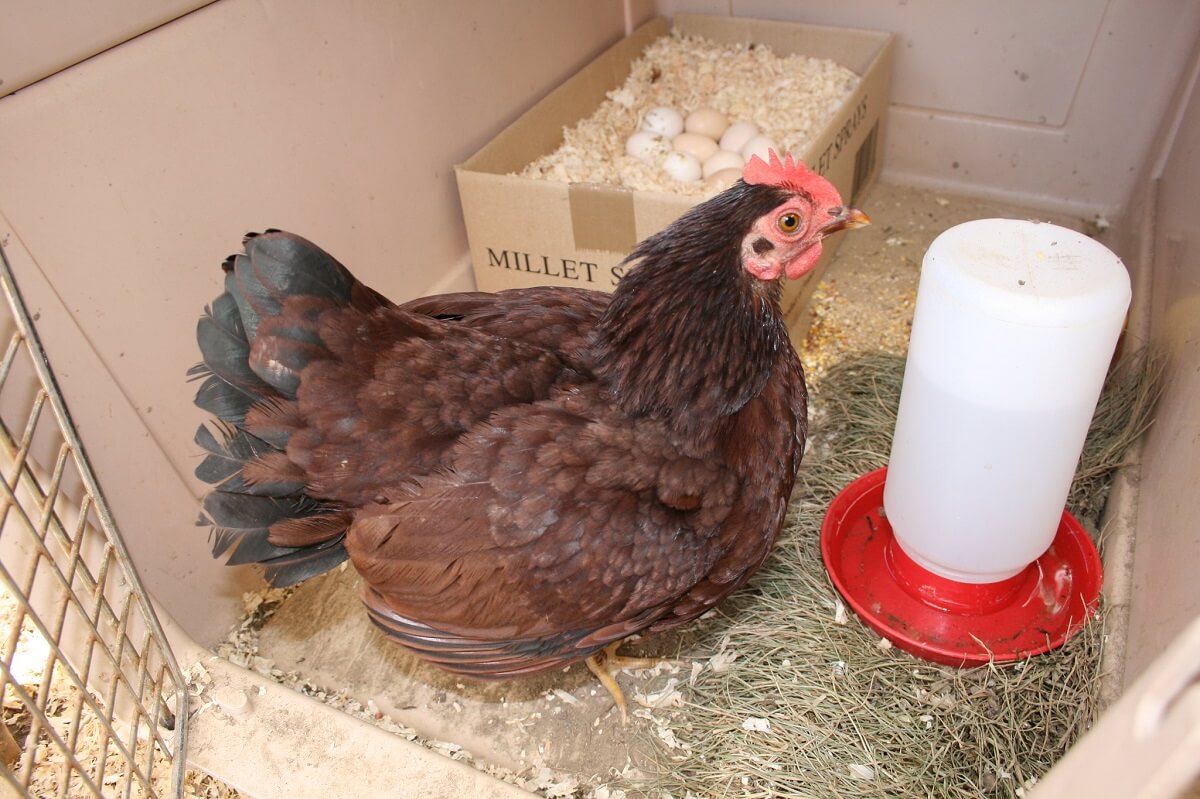
Once you have separated her, put her in a private area. It can even be a box in your garage because the hen stays on the nest almost continually. She will only leave the nest for food and water a couple times a day.
Related Post: Buying Baby Chicks: A First-Timer’s Guide
She doesn’t need much space at all. It is important that it’s a quiet, dry place, free from drafts and predators including family dogs and cats.
Simply give her a small straw nest and place the eggs under her. I like to give her eggs from other hens as well as her own. This will ensure a variety of chicks.
How Many Eggs Should You Let Her Sit On?
This is a somewhat controversial question. I don’t think there is a perfect number. My mother-in-law who is well into her 90s (and has raised chickens her whole life) only lets the hen have a handful of eggs. She says never more than six eggs and usually 3 to 5.
I, on the other hand, push the envelope and give the hen 10 to 12 eggs. I figure if she is going to sit there for three weeks, it may as well be worth it!
Consider the size of the hen. A larger hen can obviously handle more eggs than a bantam hen. I once had a sneaky hen (who I didn’t know had gone to setting) hatch 21 eggs!
Write Down The Date
The incubation time for chicken eggs is 21 days. Write the date she went to setting on the calendar and count ahead 21 days for the hatch date. You may think you will remember, but I highly suggest you write down these dates because life gets busy and you may forget.
4. Leave The Hen Alone
Check on your hen twice a day. Then, just leave the hen alone and don’t handle her. She will probably come off the nest to eat and drink when nobody is around. You will be able to tell because the food will be disturbed.
If the hen removes an egg from her clutch, dispose of it (she can tell it’s a dud). You could double-check by candling it, but most likely she is right.
5. Prepare For The Big Hatch
Monitor the hen more closely the last few days, but try to resist the urge to constantly disturb her. I lift the hen up once a day to look for chicks. If there are chicks, I remove the shells. Sometimes the hen will eat part of the shell and that is okay. It contains nutrients she needs.
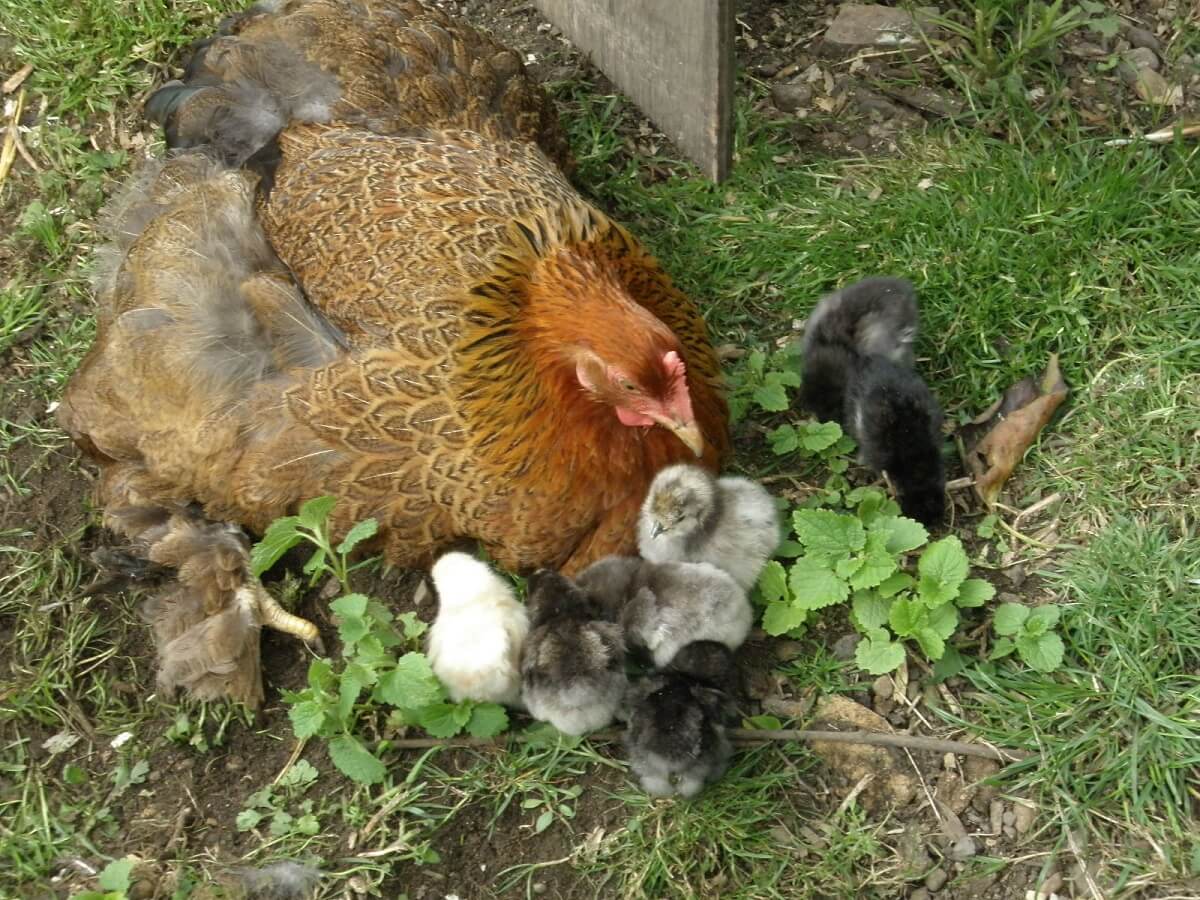
Like any newborn baby, the chicks will sleep a lot and stay under their mother for the first few days. The hen will leave the nest and start taking the chicks to food and water when all the eggs hatch. There may be an unhatched egg or two so remove them and any remaining shells, and provide clean bedding.
6. Support The Mother Hen
The hen will teach her chicks where the food and water are. I scatter a little feed around the brooder. She will scratch and cluck for her chicks, and they will come running. It is fascinating to watch.
Related Post: Raising Baby Chicks: A Guide For First-Time “Parents”
Also make sure the water dish isn’t so deep that a chick could drown. I use a very flat waterer for a couple of weeks.
7. Move Your Chicks
You can move the hen and chicks to a different location, but do not put them with your flock until the chicks are at least one month old — longer is better.
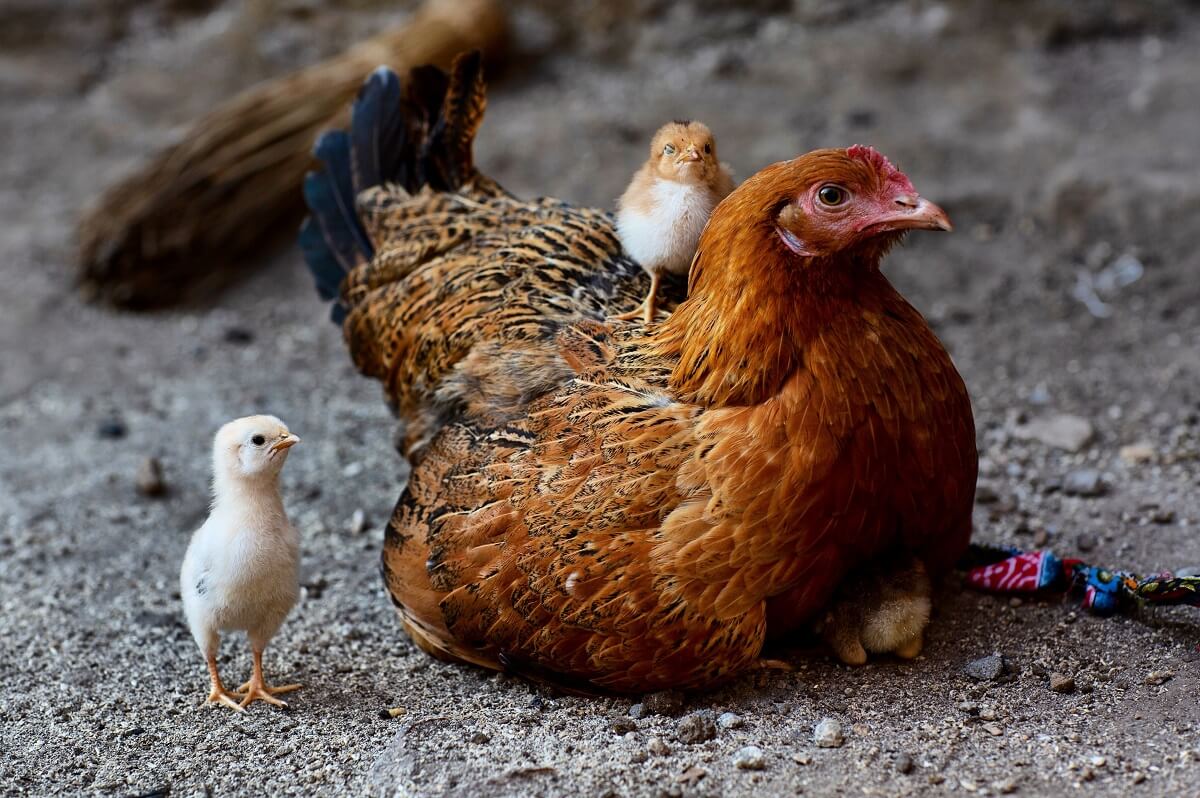
The chicks will continue to sleep under the hen for several weeks. Once the chicks are feathered, they probably won’t need their mother, but I allow the hen to take care of the chicks as long as she is willing.
Troubleshooting
What if the hen will not set on the eggs?
Perhaps, your hen isn’t broody enough. Sometimes when hens are just becoming broody and you try to move them too soon, they will not be willing to sit on the eggs. If there is no danger of frost, you can leave the eggs in the nest, and let the hen go for a couple of days. I usually try three times before I give up on the hen.
What if the hen leaves the nest before the eggs hatch?
In rare cases, the hen will leave the nest before 21 days and give up on her clutch of eggs. If she was scared by something, you can try to put her back on the nest. If she still won’t set, perhaps the eggs are duds (you can candle the eggs to see if chicks are forming). If you have an incubator, you can finish incubating the eggs in there, but it is unlikely the hen will take the chicks. You will have to raise them in a brooder box.
What if none of the eggs have started to hatch at 21 days?
I usually give the eggs until about 24 days. If any eggs haven’t hatched, I candle them. If there is a chick, I carefully peel an egg open to see if it was a live chick. Most likely the chick will be dead or the egg will be unfertilized. It is disappointing when this happens, but sometimes it does.
What if chicks have hatched and there are still eggs left in the nest?
If the hen has left the nest, they are probably duds, and you can crack them open to see. I actually did this once and there was a live chick. However, it was very weak and died shortly after.
I have tried to answer questions for most possible scenarios, but if you have more, please feel free to reach out to me in the comments section below.
I hope this beginner’s guide to hatching eggs with a broody hen encourages you to use your hens to build a self-sustaining flock. Watching a hen with chicks is both entertaining and educational. I encourage you to give it a try.




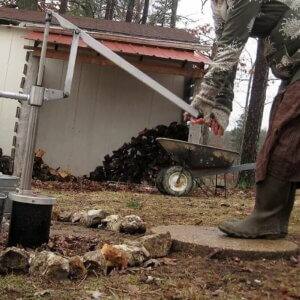































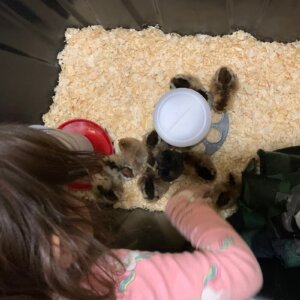





What a helpful article, Amy! We’ve had our ducks hatch their own clutches, but this spring is going to be the first we try to let our hens do their thing. There’s a lot of similarities between them, it seems, though I didn’t know how to handle a broody once I got one going. Your article gave me exactly the tips I needed–hopefully there will be some fuzzy cheeping things soon enough!
Thank you for all the info, my question is, I have two broody hens in my brooder house. One of the hens will hatch 3 days before the other. will their be a problem with having two hens together in the same house and also eggs hatching 3 days?
As long as there are only 2 hens hatching 2 clutches of eggs, there shouldn’t be a problem. If you have additional hens who are not broody, the hatching hens and chicks should be moved. The non-broody hens will probably pick on the chicks. I hope this helps!
This has been the most helpful of all the articles I’ve read on hens sitting and hatching. This is a first time for hen and myself and I’m so nervous 😊 I was given fertile eggs from a friend and today is day 21, so I will wait a few more days if nothing happens. Then try again if she goes broody again.
Thanks so much,
Sally
When a hen sits for weeks on her unferitilzed eggs will she join her flock again? How long will she wait? We only have hens. Can she just continue to try again to sit on unferitilzed eggs again? And would that be good or healthy or could she become unwelcomed and eventually banished. I know nothing but I want to prevent un rest within the hen flock
Thank you Amy, I’ve had hens for a few years and was given a rooster recently. I had no idea on what to expect, you’ve answered the questions I had.
Thank you for writing on the subject. I have broody hen she sat on her the fertile duck eggs for 10 days and today she has barely been on the eggs and appears to have lost interest. Could this mean there is something wrong with the fertile chicken eggs? Or has the chicken just lost interest?
My Hen has been setting on her egg for about a month now no hatching what could be the issue? Still setting on it
The eggs are more than likely not fertile and will not hatch
Thanks so much for this article. Please My Hen has been seatting on her egg for about a month now no hatching. what could be the issue? Still setting on it, is there anyway I can help her
Thank you!
I found a secret stash of eggs that one of my hens started brooding over. There is no rooster so i assume they are not fertile. How can i remove them without upsetting her and get her to use a nesting box and accustomed to my collecting?
Thanks!
When I was small about 70 years ago I was about 10 or so . We lived in WVa they didn’t have all of those thing u menition . Un could order chicks from sears and robuck . But my father and my grandmother would put the eggs out under a light they would mark one side with a pencil . And turn the eggs every day ! My question is how warm did the eggs have to stay in order to hatch ! Thanks Malcolm
If u. Want to have fun ! My uncle had a hen that was setting . So he desided to put some duck eggs under her .Neely they hatched she had a few chicks and 4 ducks 🦆. She was out walking he had a Verry small place for the ducks to play in . The hen ducklings. Desided it was time to go for a swim. The next thing the hen was on the bank squeaking and what ever they do but she couldn’t get the little ducks out ! I thought it was funny
Hi there, I found a nest of eggs hidden deep in some ferns in my yard. The hen hasn’t sat in them for awhile now and I did candle them. There are chicks forming but I have no idea when they were mated. Can they still hatch or should I just get rid of them? We haven’t had any frost but it did get down into the 50’s overnight once or twice. Thanks in advance for any insight that you would have.